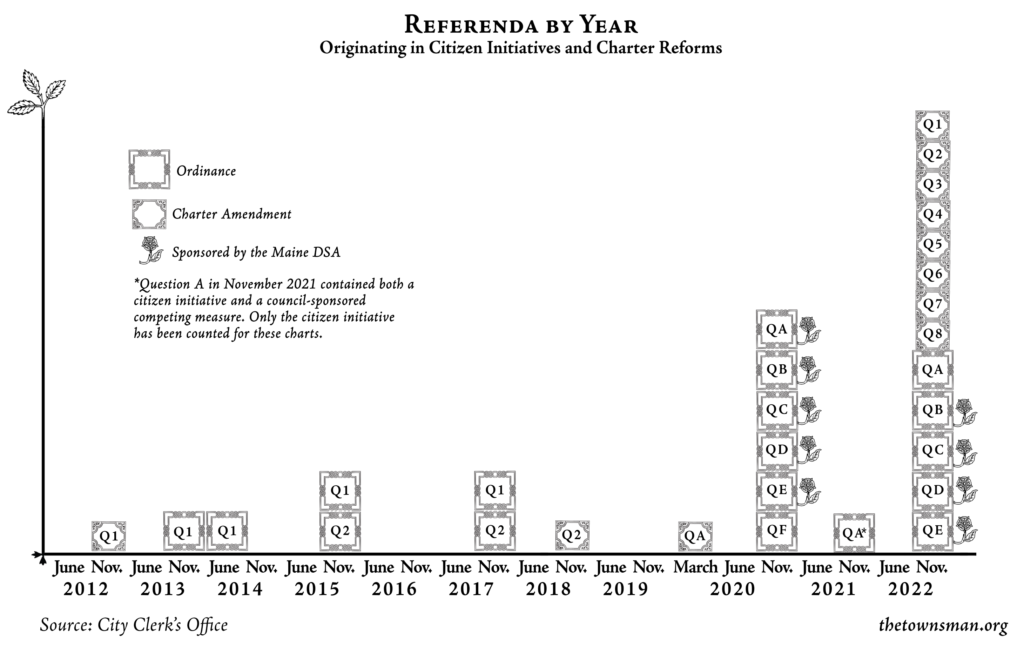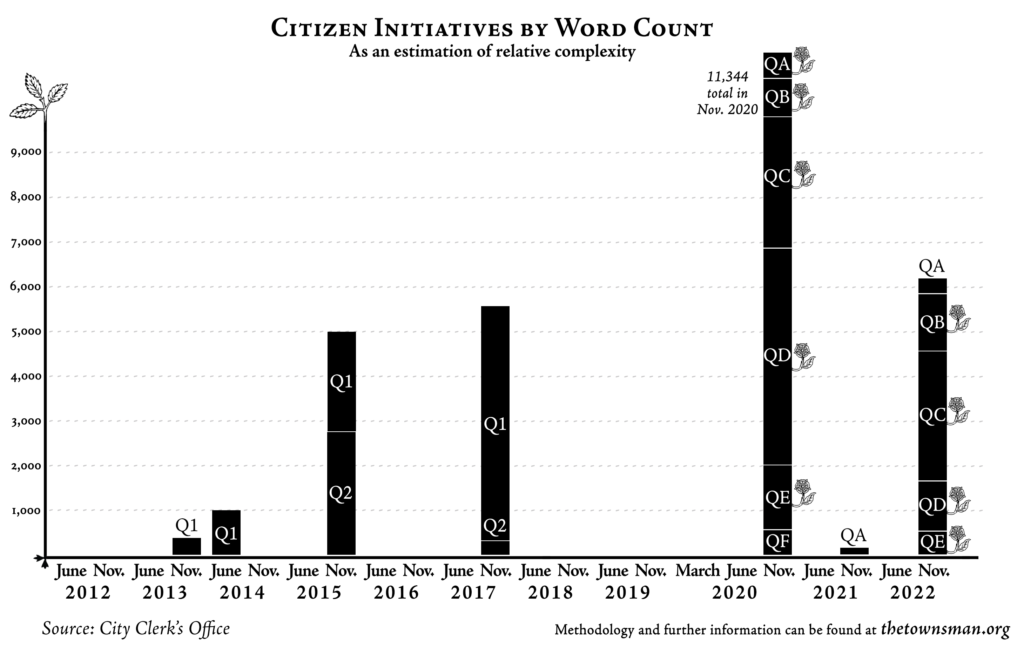“The regular meetings of the Council shall be held in the room known as the City Council Chamber or such other room as deemed appropriate in City Hall in one session at 5:30 p.m. on the first and third Mondays of each calendar month… The date or the time of any regular meeting may be changed by an order passed at a previous meeting of the Council or by warrant for a special meeting called in lieu of a regular meeting; provided however, that said change in date will still provide for two regular meetings in one month.”
Rule 1.A, Rules of Procedure of the City Council
Those that follow the affairs of Portland’s City Council (including regular readers of City Council Review) likely already know that, typically, the council meets on the first and third Mondays of each month. But they may also know that every once in a while, especially during the balmy Maine summer, that they meet only once in a month. Most residents, (including myself until recently,) likely haven’t thought much of this. Sometimes there’s only one meeting, and that’s just how it is.
But true council jockeys know better. In the very first section of the very first rule of the City Council’s governing rules of procedure, it states that the council must meet twice each month. Furthermore, it bars the council from simply waiving this responsibility; it can reschedule meetings to different dates and times, but it can’t just cancel one of the meetings. The City Council must meet twice each month.
But… there’s no rule that says these two meetings can’t be on the same day.
And so it is that meetings like this past Monday’s, which stretched over six hours into the night, are technically two consecutive – legally distinct – meetings. The first meeting of the month began at 4:00 PM (an inconveniently early start for nine-to-fivers) and was adjourned by around 5:30, after which the second meeting of the month shortly began. This results in a truly marathon council session, which only ended after 10:00 PM last Monday, but it means that the councilors and staff are free to spend the second Monday how they please (especially gratifying in the summer months.)
While this irregularity can sometimes incite criticism from those previously-mentioned council jockeys, and there are some gray-area interactions with other council rules, it’s completely (technically) legal and widely accepted as harmless. Indeed, it’s hard to avoid smirking when one first grasps this workaround. It’s a clever way to bend the rules and give the hard-working councilors a bit of summer break, and nobody gets hurt. Right?


Chapter 9
Even a casual observer of Portland politics knows that the sudden rise in citizen initiatives presented to voters beginning in 2020, and the relative complexity of these initiatives, has been a dominating topic. Portland’s code of ordinances features an unusual combination of provisions which grant such citizen initiatives (colloquially known as “referenda”) substantially more potency than even other New England cities. Many residents feel as though the law, as it is written, creates perverse incentives and unfairly binds the hands of elected officials. Others think that curtailing these initiatives would strike a blow against democracy in the city, disempowering voters from acting directly on important issues. The debate between these two camps has been among the most vitriolic across Portland, (a crowded field.)
Advocates for the status quo assert that the majority of ordinary Portlanders agree with them, and just as confidently proponents for reform claim the same. Given that the sorts of people who attend (let alone comment in) City Council meetings are a small fraction of the city’s population, it’s difficult to gauge the accuracy of these mutually-exclusive claims. Truly, the only way to unequivocally assess the popular mood would be, ironically, a referendum on referenda. By sending a reform package to the people to vote on, the City Council could show one way or the other how Portland, as a whole, feels about the current process.
This is precisely what the City Council, or at least a majority of the council, had been attempting to do. At the request of a majority of councilors, Mayor Snyder scheduled public workshops for the council as a whole to discuss the issue. Per city law, the only way to reform Chapter 9 (containing the provisions for citizen initiatives) is for the City Council to prepare amendments, put these on the ballot, and enact them only if a majority of the city’s voters approve. By this method, the Council spent months and two public workshops debating and proposing reforms to Chapter 9, taking in expert counsel and public comment along the way. The list they came up with was somewhat disjointed, allowing for a shorter timeframe of un-amend-ability if the council was acting in supermajority, requiring city staff to prepare a fiscal impact statement for all citizen initiatives, and other sundry adjustments. Several hot-button ideas, such as raising the signature requirement for a petition to qualify, were left on the cutting room floor to produce this overall moderate package.
Not every councilor was hot on the idea. Councilor Pelletier was by far the most critical of this action, and Councilor Trevorrow also showed serious hesitance toward the whole process. But the remaining members of the council, to varying degrees and in varying ways, all recognized and advocated for reform to Chapter 9. Among them, Councilors Dion and Zarro (both now mayoral candidates) frequently posited strong opinions about how they’d like to see the process reformed.
With two (unusually productive) council workshops under their belts, a final package of reforms was presented on Monday, July 17th to be sent to voters in November. The only meeting in July, and as a result, the last possible opportunity to meet the ballot deadline.
The Perfect Storm
A perfect storm of factors aligned to make this Monday meeting an especially taxing one. First, of course, it was a double meeting, meaning that the council had a full month’s worth of work to dispatch with in a single night. Typically this wouldn’t be a problem, as in years past work was light in the summer months. But times have changed. Since so much business is now being handled directly by voters on November ballots instead of by elected officials, the period around the ballot deadline (which is in summer) has become a lot busier. At the next meeting, in August, for example, another rent control referendum will be sent to the voters. This will be the third consecutive election to feature a rent control amendment referendum, leaving some observers to lament that “we’re going to be voting on this forever.”
But this wasn’t the only complicating factor on the 17th. Due to skyrocketing expenses which the State of Maine demands its municipalities pay to fund general assistance programs, the city of Portland had been seeking additional state funds to lighten its tax burden. These funds seemed likely to come, but as with all things in Augusta – it was slow going. It wasn’t until this July meeting that the state funds were finally secured and Portland could pass its budget, avoiding what would have otherwise been a crushing increase in property tax. As a result, even though these budgets are typically passed months earlier, it was only in this meeting that the council could finally vote on a long slog of fiscal orders to keep the city functional.
A number of other items of interest, including important appointments and updates from the encampment response team, also populated the agenda that night. In short, it wasn’t just a long night, beginning at 4:00 PM and going well past 10:00 PM, it was a busy night too.
But not even a glimpse at the agenda could have predicted the controversies which emerged. What many thought would be an unassuming wage adjustment for Portland’s Police Department (an order tucked inside the various budget matters) turned into an unexpected firestorm. Councilor Phillips took time to suggest that, given the general mood towards police bias as well as doubts she had as to how well the PPD had handled April 1st’s neo-Nazi rally, that perhaps part of this wage increase should be delayed until the PPD could demonstrate its ability to combat bias. She stressed that she was not anti-police, and certainly not anti-PPD, but nevertheless wanted some way of ensuring accountability.
Councilor Dion, a former law enforcement officer and fierce supporter of Portland Police, was enraged by the (what he claimed to be) misinformation being spread by Ms. Phillips. The full account of the dispute, which soon embroiled the whole council, can be read in loving detail in our City Council Review, but suffice to say that it was a heated spat which took a lot of energy from the most involved parties – especially Dion.

Running on Empty
At last, near 10:00 at night and following more than five hours of intense engagement, the City Council picked up the matter of Chapter 9. Had things unfolded differently, this wouldn’t have been a problem; after all, the council had already engaged in lengthy discussions on the matter in previous workshops, and now could simply make any last-minute adjustments before sending it to the November election. After that night, it would be the people’s to discuss, not theirs.
But in the 72 hours prior to the meeting, a blitz of highly-critical attacks was launched against the council by several of Portland’s left-wing advocacy groups. Former Mayor and Democratic Socialists of America organizer Ethan Strimling likened the councilors to Ohio Republicans, and insinuated that they were acting at the behest of the Portland Chamber of Commerce. Progressive Portland, another advocacy group, called the reforms that would have been placed on the ballot “anti-democratic,” accused the council of trying to disenfranchise citizens like “MAGA Republicans,” and predicted that city staff would “inflate” fiscal impact notes to scare people into voting ‘no.’
These calls for residents to show up, call in, or submit written comments to the council worked, as in a very short period of time, multiple councilors testified, they received an unusual degree of correspondence mostly repeating the same basic refrain. This clearly had the intended effect, as despite having a solid majority before Monday, those majority supporters began to show signs of reticence.
But Councilor Ali and Mayor Snyder opened with strong defenses of the work that the council had done in workshops, and though more hesitant, Councilor Rodriguez too expressed interest in getting something done for the November ballot that night.
Councilors Dion and Zarro, despite being strong advocates for reform just hours earlier, were now appearing to crumble under criticism and exhaustion. Mark Dion, especially, seemed unlike himself. Usually a powerful critic of current Chapter 9 provisions, he appeared to act lackadaisical and even somewhat silly in his response to the sudden pushback. He even floated the idea of delaying action until 2025, a highly out-of-character suggestion. And Councilor Zarro, usually agile in defense of himself and his fellow councilors, seemed as though he could not bring himself to offer even a lukewarm argument.
When a (clearly also tiring) Councilor Phillips suggested ending the debate and killing the measure via indefinite postponement, it was at first unclear which way the vote would go. Councilors Fournier and Phillips had been pushed into opposition and so would vote ‘yes’, but against all expectations, Councilor Dion also voted in favor of this execution. Since at least five other councilors had also signaled their support for indefinite postponement, what might have been a difficult question for Zarro (who voted after Dion) became simpler. The measure was going to be postponed, all he had to decide was whether or not to offer a purely symbolic “no” vote. He did not deign to, and threw in with the odd new majority, leaving Councilors Ali and Rodriguez, and Mayor Snyder, alone in the new minority.
How did the council’s pro-reform faction go from a strong majority to just three votes? There’s no single answer, of course. The sudden wave of criticism surely had an effect, but it wouldn’t be the first time the city council simply ignored a wave of criticism. The weightiness of the matter surely also had an effect, but most of the councilors are fairly seasoned at this point and no stranger to weighty concerns.
But the human element shouldn’t be underappreciated. The observations of the councilors’ behavior is, of course, a purely subjective one made by this author and her colleagues. But a long, dense, contentious meeting like this one would make almost any normal person exhausted, irritable, and complacent. I’m sure you, reader, have had similar experiences in your personal or professional life. If the issue had been taken up at 6:00 instead of 9:45, if Councilor Dion had more fight left in him, if Councilor Zarro was as verbally acute as he was a few hours prior, if an unceremonious indefinite postponement hadn’t become the only obstacle between the councilors and going home, who knows? Perhaps things would have gone down differently.

The Future of the Loophole
These double meetings have been held for many years, they are not a recent innovation by Mayor Snyder or anyone else in city government. South Portland has a very similar procedural arrangement, and the cities of Lewiston and Westbrook only require one meeting per month anyway. Portland isn’t unique for occasionally scheduling a load-bearing meeting, nor would it be reasonable to predict an especially exhausting one like this. Furthermore, normal single meetings are also sometimes packed with content and go late into the night; it’s not something unique to double meetings. Nevertheless, nights like these call the practice into some question.
Asked for a statement, Mayor Snyder had this to say: “After several years of not being able to schedule the two required City Council meetings in July, and in August, we are working to re-establish the practice. In addition to the July and August meetings, consistent practice has been to combine the Inaugural Meeting and the first Council meeting of the month in December.”
The days may be numbered for summertime double-headers.
It is not the opinion of this author, nor of any reasonable person, that these double-meetings are a sinister or malicious ploy. Rather, they resemble more closely a sort of quaint relic, something that in a different time or in a smaller town would have been utterly harmless. But times change, Portland is growing and facing great challenges, its government is being put under new pressures, and its citizens are reacting in ways that can’t always be predicted. It may be that small-town practices will no longer cut it as Portland creeps back towards the economic heights of the mid-20th century.
But, in any case, if you’ve ever wondered why the council occasionally talks about one very long meeting as if it were two – now you know.
Ashley D. Keenan – Ashley is an editor of The Portland Townsman, writer on urbanism, local small business-owner, and Maine native. Her work primarily covers the national housing crisis, building sustainable and livable cities, responsible market economics, and New England culture and history. She lives in Portland with her fiancé and can be personally reached at ashley@donnellykeenan.com.



Who cares? What people care about is Portland’s political class are real estate lackey’s , you’re side gets whatever it wants basically. I ran for office in 2016, not a single person on doors told me they are upset about Augusta or Portland’s “meeting schedules”. Its really funny what the 2010’s brought into force, political hobbyists. Mostly middle class white kids tailing Democrats and now real estate politics unpaid, hoping to be part of system one day. Extra hilarious you cite Ethan Strimling, who worked his whole career to turn city hall into a clown show. From his election denial stunt in 1999 to his time in office in which he just got on the front page of the paper any time he could and ended his stint losing every ward in the city…. He has nobody to hang with but DSA, telling young college grads how bad the system is…. Sure Ethan was always a progressive reformer working for everyday people LOL
Yawn
Everyday people in Maine want housing they can afford , not new meeting ideas.